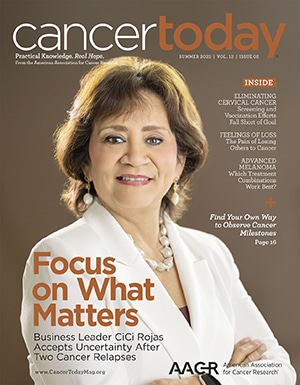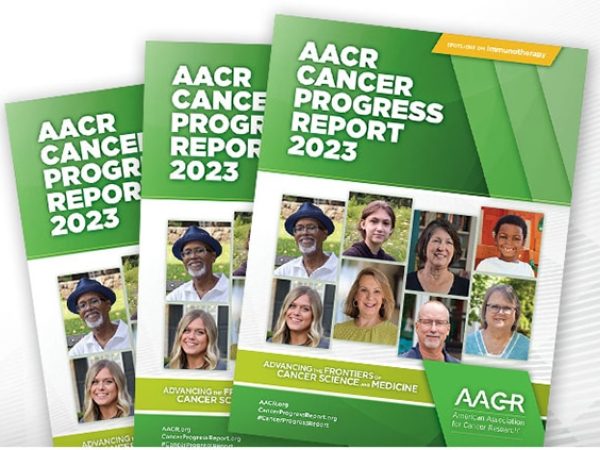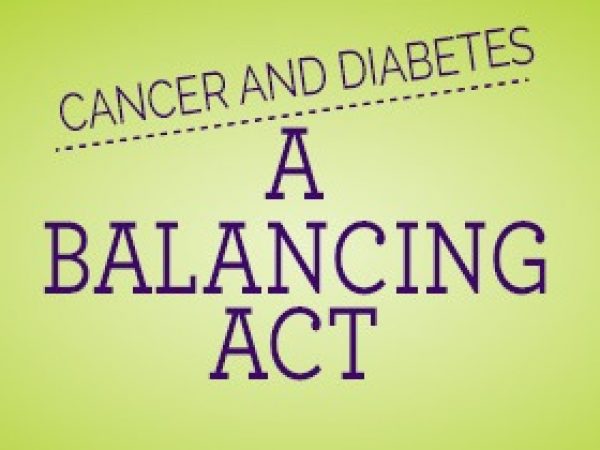Highlighting AACR Resources for Cancer Survivors
As we celebrate National Cancer Survivor Month, we are aware how the term survivor can take on many meanings for those who have received a life-altering cancer diagnosis. Some people eschew the word in exchange for others that more aptly describe their experiences: There are warriors and thrivers. There are those who move on without looking back and those with advanced cancer who will continue treatment for the rest of their lives.
The National Cancer Institute notes a person becomes a survivor from the time of their diagnosis and remains a cancer survivor as long as they live. The National Coalition for Cancer Survivorship, which first called to change the language around cancer survival in 1986, has expanded the definition of survivor to include family, friends, and caregivers—whom patients rely upon as they undergo treatment regimens that can include a range of therapies, including chemotherapy, surgery, radiation, targeted treatments, and immunotherapy.
With more than 50,000 members worldwide, the American Association for Cancer Research (AACR) focuses on cancer research, while keeping those affected by cancer directly in view. During National Cancer Survivor Month, the AACR would like to thank cancer survivors who have helped to shape the organization’s focus and resolve to cure all cancers. As June comes to a close, we’d like to highlight our organization’s patient and survivor resources—as well as these stories.

Cancer Today, a quarterly magazine, for survivors and caregivers, highlights how research affects people living with and beyond cancer. ln the spring 2022 issue, the magazine published a story about Connor Joe, who dreamed of making it back to Major League Baseball after being diagnosed and treated for testicular cancer that had spread to his lung. Joe made that dream a reality in that same spring, as he started for the Colorado Rockies. There are others, like Trevor Maxwell, who was diagnosed with stage 4 colon cancer. When Cancer Today published his story in the winter 2021-2022 issue, Maxwell had no evidence of disease, but he was under no illusion that his advanced cancer would stay at bay. On May 19, 2022, he announced the cancer had come back. Maxwell had his fifth major surgery and continues to advocate for mental health support for men, creating a “wolf pack” through his nonprofit, Man Up to Cancer. On June 22, the summer issue of Cancer Today went live on our website, focusing on stories about survivors’ grief, cervical cancer disparities, and comorbidities and cancer. Cancer Today offers free subscriptions to people who are affected by cancer.
On Tuesday, June 28, between 1 p.m. and 3:30 p.m., the AACR is hosting The Science of Cancer Survivorship patient advocate forum—to provide dialogue to support the growing number of cancer survivors and to help meet the unique challenges that come from late and long-term effects of cancer treatments. This forum, which is part of a monthly series designed to educate and support patient advocates, will explore research around the field of cancer survivorship. The panel will highlight the experiences of Gregory J. Aune, MD, a pediatric oncologist at UT Health San Antonio who was diagnosed with Hodgkin lymphoma at age 16; Patty Spears, a breast cancer survivor and cancer research patient advocate at UNC Lineberger Comprehensive Cancer Center; and Adam Hayden, a philosopher and glioblastoma survivor, along with AACR President Lisa M. Coussens, PhD, FAACR; Anna Barker, PhD, FAACR, the chair of the AACR advocacy program; and Susan Hong, MD, MPH, the director of the Cancer Survivorship Program at VCU Massey Cancer Center. Register here.
Earlier this month, the AACR released the Cancer Disparities Progress Report 2022, providing in-depth analysis of how large segments of the U.S. population shoulder a disproportionate cancer burden. As one striking example, while the overall cancer incidence rate is lower in Black individuals compared to white individuals, Black people have the highest overall cancer death rate of any racial or ethnic group. These disparities are also pronounced in people living in rural areas and those experiencing persistent poverty and/or belonging to sexual or gender minorities. This report also highlights more survivor stories—giving shape to issues, such as financial toxicity, the confusion around the term palliative care, and language barriers in seeking care.
Each June as the AACR commemorates National Cancer Survivor Month, the organization continues to balance the exacting and involved work of research, while also telling the transformative stories of cancer survivors. It’s these stories that renew the AACR’s resolve to continue to push for more research. As the organization funds and elevates opportunities for collaboration, the AACR would like to thank the people who’ve shared their stories in the hopes of improving outcomes for others. This month, and every month after, the AACR proudly stands with survivors.
To learn more about ways to support cancer survivors, please visit the AACR website.



